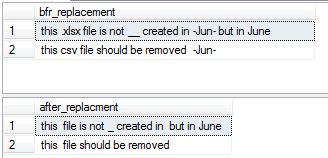I have been using the REPLACE function to remove characters from a text value in a table. It has just grown over time and now the query is quite messy.
What can I do to make this more efficient? Is there a Regex example that I could implement?
Query:
SELECT
REPLACE(
REPLACE(
REPLACE(
REPLACE(
REPLACE(
REPLACE(
REPLACE(
REPLACE(
REPLACE(dbo.[RemoveNumericCharacters](Filename), '.xlsx', '')
, '.xls', '')
,'csv', '')
,'---_pdf', '')
,'.', '')
,'-Jun-', '')
,'-Jul-', '')
,'Jul', '')
,'__', '_')
as 'ConvertedFilename'
FROM @Files
Function:
ALTER Function [dbo].[RemoveNumericCharacters](@Temp nvarchar(1000))
Returns nvarchar(1000)
AS
Begin
Declare @NumRange as varchar(50) = '%[0-9]%'
While PatIndex(@NumRange, @Temp) > 0
Set @Temp = Stuff(@Temp, PatIndex(@NumRange, @Temp), 1, '')
Return @Temp
End

